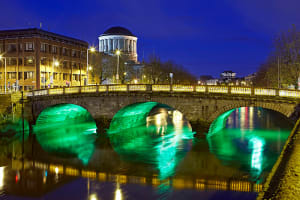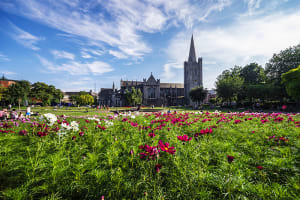Ireland Travel Information
Ireland Vacations & Travel Tips
Health and Safety
Ireland is safer than most countries in Europe, but normal precautions should be observed. In Dublin, drug-related crime is not uncommon and the city has its fair share of pickpockets and thieves.
Northern Ireland is as safe as anywhere else, but there are areas where the sectarian divide is bitterly pronounced, most notably in parts of Belfast. For the foreseeable future, it's probably best to ensure your visit to Northern Ireland doesn't coincide with the climax of the Orange marching season on 12 July; sectarian passions are usually inflamed and even many Northerners leave the province at this time.
Region: Europe
Ireland Destinations:
- Dublin
- Co. Cork
- Belfast
- Co. Cavan
- Co. Clare
- Co. Galway
- Co. Kerry
- Co. Kilkenny
- Co. Limerick
- Co. Wicklow
Featured Ireland Hotel
-
See All Ireland HotelsBook Now
The Morrison Dublin, Curio Collection by Hilton
Temple BarOur 4-Star classification designates those properties with well-appointed, deluxe accommodations, extensive amenities and comprehensive guest services. Expect attention to detail and a warm and hospitable staff ready to cater to your needs. These superb properties offer a truly refined getaway.-
 Breakfast Not Included
Breakfast Not Included -
 No Spa Services
No Spa Services -
 No Meal Plans Available
No Meal Plans Available -
 No Villa
No Villa -
 No Honeymoon Amenity
No Honeymoon Amenity -
 Charge for Wi-Fi
Charge for Wi-Fi -
 Elevator(s)
Elevator(s) -
 Gym/Fitness Center
Gym/Fitness Center -
 Non-Smoking Property
Non-Smoking Property -
 Air Conditioning
Air Conditioning
Overlooking the River Liffey, this hotel with stylish décor and practical amenities is ideally located near dining, shopping and entertainment.
-
When to Go
If you go to Ireland in July or August, you can expect reasonably warm weather, longer days and a lively menu of festivals. However, this is peak season, which presents some challenges if you're wanting a bit of solitude.
Spring and autumn can also be delightful seasons, with smaller crowds of tourists. Winter weather can be downright inhospitable, but Ireland (the west coast in particular) does look beautiful in the rain, and there's nearly always a pub nearby to duck into. However, in many Irish towns restaurants and B&Bs close down around October and don't reopen until Easter. With a few advance phone calls you can avoid getting stranded somewhere with no place to sleep or eat.
Despite its northern latitude, Ireland's climate is moderated by the Gulf Stream, bringing the dregs of Caribbean balminess, as well as turtles and triggerfish. The temperature only drops below freezing intermittently during the winter and snow is scarce. Summers aren't really that hot, rarely hitting 30° C (86° F), but it stays light until around 23:00. Whatever the time of year, be prepared for rain because Ireland is wet. The heaviest rain usually falls where the scenery is best: luscious County Kerry can be drizzle-bound on as many as 270 days of the year. If you do find the rain getting you down you might find some comfort in the Irish saying: 'It doesn't rain in the pub'!
Money
Euro
Getting Around
There are scheduled nonstop flights from Britain, continental Europe and North America to Dublin and Shannon, and good nonstop connections from Britain and continental Europe to Cork. There are numerous ferry services between Britain and Ireland, and a few between France and Ireland, but it's definitely wise to plan ahead as fares can vary considerably.
Distances are relatively short and there's a good network of roads, but public transportation can be infrequent, expensive or both and - especially with trains - not reach many of the more interesting places.
Having your own transport is a major advantage and it's worth considering car hire for at least part of your trip. The growing network of motorways have cut journey times considerably, but the huge network of secondary and tertiary roads are much better if you want to 'experience' Ireland as you travel - although it is still true that smaller, rural roads can make for difficult driving conditions.
Travel Tips & Tools
Practical information to assist you before and during your trip.






